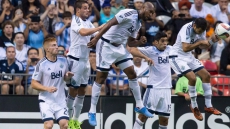VANCOUVER — For decorated Grey Cup quarterback Travis Lulay, the expansion of a B.C. Lions' initiative to raise awareness about domestic violence against women goes way beyond throwing touchdowns.
"To be able to make a positive impression on young people is … a pretty powerful thing," said Lulay, who has visited classrooms and talked with students since the Be More Than A Bystander program's inception in 2011.
"This is an issue that affects us every bit as much as it affects other people. Just because we wear the armour and crash into other guys doesn't mean violence is an answer to solving issues off the field."
The program is a partnership between the Lions and the Ending Violence Association of Canada aimed at raising awareness among youth about the problem.
While there have been spin-off projects in several other Canadian football franchises, the CFL has gone a step farther by launching a league-wide initiative. It expands on the teams' public outreach agendas and introduces mandatory, annual, violence-against-women education sessions for all CFL employees — staff and players.
It empowers the league commissioner to issue discretionary sanctions ranging from fines and suspensions to lifetime bans. A no-tolerance, anti-violence policy will also apply to members of the public attending any CFL event or game.
The move comes after a number of high-profile incidents involving professional athletes, including a now-infamous 2014 video showing NFL running back Ray Rice knocking out his fiancee with a punch in a casino elevator.
"It's important to recognize that the problem persists not only in football or sports in North America, but it's a global problem and deserves attention," said CFL Commissioner Jeff Orridge in an interview.
"It was really just a matter of ... as a league, getting behind what teams were already doing."
Ending Violence Association executive director Tracy Porteous has been closely involved in developing the expanded CFL program and calls it "a thousand per cent groundbreaking."
"I've been working in the field of violence against women … for 32 years and the biggest deal I've ever come across is the partnership we built with the B.C. Lions," she said.
"What the CFL has done is in the same category. I've just never seen anything like it."
Player and staff training sessions are slated to begin next year, though Porteous has already held one for the entire Lions team.
As for the outreach component, football was a logical option, said Porteous, not because football players are more violent but because it's a masculine sport of "larger-than-life men who can carry a conversation about masculinity the way feminists can't."
Lulay said he believes violence against women is more prevalent in sports — especially male-dominated sports. He attributes that partly to what he calls a crisis in masculinity, noting football players are often marketed as modern-day gladiators.
"All of that can lead to the impression of what it is to be a man, when really it's about how you treat other people, as opposed to just how much weight do you lift, how hard can you crash into another human."
It's a view shared by lawyer and three-time U.S. Olympic gold medal swimmer Nancy Hogshead-Makar, who founded Champion Women to advocate for women and girls in sport.
Domestic violence is more common among athletes in male-dominated sports, said Hogshead-Makar, who points partly to an athlete culture that she says disrespects women and equates femininity with weakness.
"It takes time to undo a culture," she said. "All of their lives they've been told female equals second class."
Hogshead-Makar welcomed the CFL's program, but warned that the most important element of any effective anti-violence project is discipline. Sports associations need to feel they can sanction even their most indispensable star players, she said.
"What's great about the Canadian Football League (is) they didn't have to. Nobody was holding a hammer over their heads," added Hogshead-Makar. "My hat's off to them for that."





